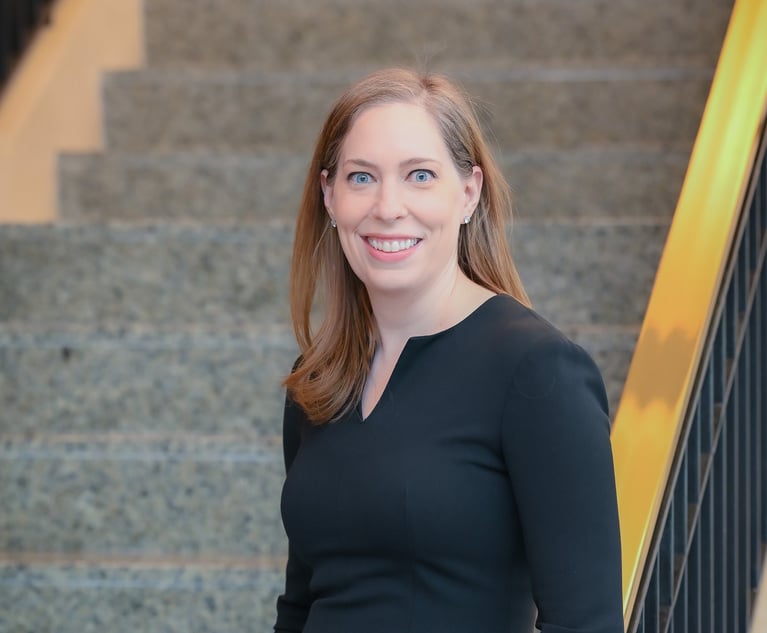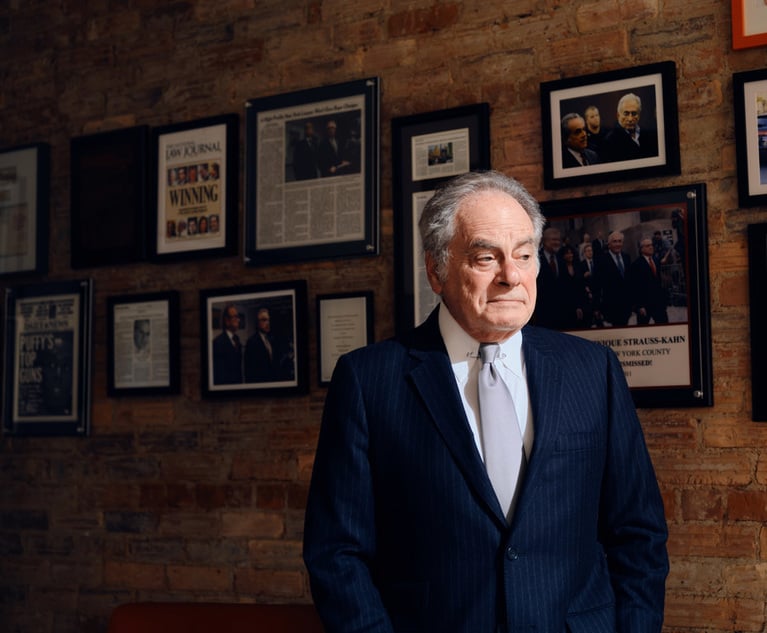Litigator of the Week: And Client Number Three Is…
It was the denouement in the riveting drama that played out over two days before U.S. District Judge Kimba Wood : When Davis Wright Tremaine partner Rob Balin convinced the court to compel Michael Cohen's to reveal his third client.
April 20, 2018 at 10:27 AM
6 minute read
The original version of this story was published on Litigation Daily

It was the denouement in the riveting drama that played out over two days before U.S. District Judge Kimba Wood in Manhattan federal court. Attorneys for Michael Cohen, President Donald Trump's personal attorney, were desperately trying to keep Judge Wood from forcing them to reveal the third mystery client they said may have privileged communications among the materials seized from Cohen by the government.
The assembled press corps was there hoping for the reveal, as was Stephanie Clifford, the adult film actress who goes by Stormy Daniels. Cohen paid her $130,000 as part of a hush deal just before the 2016 election that made his client president. She is currently suing the president to nullify the deal.
Cohen's other clients were already made public in a filing earlier in the day. One was, obviously, Trump. The other was a former Republican National Committee official. Cohen helped negotiate a $1.6 million payment to a former Playboy model with whom the official had had an affair.
The third, McDermott Will & Emery partner Stephen Ryan told the court, was a prominent public figure who did not want to be exposed, considering the sticky situation Cohen had found himself in.
In the midst of Ryan's attempts to persuade a skeptical Judge Wood to keep the name from becoming public, Davis Wright Tremaine partner Rob Balin rose to address the court.
“I must tell you: I've been practicing at the media law bar for 30 years, and this may be the first time I've been in court with a porn star and the president's lawyer,” Balin said in a subsequent interview.
Technically, Balin, a three-decade media law veteran, was there representing five media organizations, including The New York Times, the Associated Press, and CNN. But, as he made clear to the reporters there from every conceivable outlet, he was the lawyer for all of the press.
Balin noted to Judge Wood that the case law Ryan referred to in defense of keeping the name sealed, the U.S. Court of Appeals for the Second Circuit's 1993 decision in Vingelli v. U.S., actually undercut Cohen's privilege claim.
“It states the well-settled proposition in the Second Circuit—and, frankly, everywhere across the country—that, absent some exceptional circumstances, the name of an attorney's client is not covered by the attorney-client privilege,” Balin said.
As he was about to recite a critical part of the decision, Judge Wood interrupted to ask him to just tell her which paragraph.
“I was very pleased that the judge had the case sitting there with her on the bench,” Balin recalled.
At that moment it was clear Judge Wood's mind was made up in the matter—she and Balin were literally on the same page. Moments later, Ryan was forced to reveal that Fox News host Sean Hannity was Client #3.
“We had a terrific judge, with unimpeachable integrity, who listened,” Balin said.
The reveal sent a shockwave of surprise and disbelief through the courtroom that soon spread, through the power of the media, into the daily conversations of millions of Americans. For Balin, that was the higher victory.
“To my mind, at least, while dramatic, for sure, and audible gasps, what the public got to see on Monday was our First Amendment access rights in operation,” he said.
Media law is clearly Balin's life-long passion. He says he stumbled into it after spending a few years practicing medical malpractice defense and copyright enforcement work.
“I was making the world safe for Gucci and Louis Vuitton,” he said.
In 1985, a friend who worked for Rolling Stone magazine told him about a “hip” firm that practiced media law. He started on January 1, 1986 with the predecessor to the New York office of Davis Wright Tremaine, after taking a 50 percent pay cut.
“I have never looked back,” Balin said.
Over the years he's represented small and large companies involved in small and large matters, while teaching the area at Columbia Law School. He says he appreciates moments like the hearings before Judge Wood because it's a “wonderful opportunity … to show the public what lawyers for the media do.”
“At least to my mind, what happened on Friday and Monday was very reassuring. What is envisioned by our First Amendment public access principles is what happened,” Balin said, noting that this was a team effort. His colleague at the firm, partner Rachel Strom, handled the Friday hearing, and they were both assisted by the hard work of associates Alison Schary and Adam Lazier, he said.
In an era of “fake news” accusations, Balin said media lawyers play a critical role in helping reporters tell their stories, which, in turn, helps them perform their critical role in informing the public.
“What the people need to see is what is in front of this judge—what is the evidence, what are the arguments—and that's where we media lawyers come in. To my mind, having full public access in court proceedings, especially one of such national significance as this one, is the antidote to fake news,” he said.
The results, so far, in the Cohen case left him feeling “warm and fuzzy” as a media attorney.
“Our experiment in self-government is to make as much information as possible available to the people and the electorate, so they can make their own decisions,” he said. “They'll eventually go to the polls in 2018 and 2020, and they should be able to see what happens in all their institutions, including their courts.”
This content has been archived. It is available through our partners, LexisNexis® and Bloomberg Law.
To view this content, please continue to their sites.
Not a Lexis Subscriber?
Subscribe Now
Not a Bloomberg Law Subscriber?
Subscribe Now
NOT FOR REPRINT
© 2025 ALM Global, LLC, All Rights Reserved. Request academic re-use from www.copyright.com. All other uses, submit a request to [email protected]. For more information visit Asset & Logo Licensing.
You Might Like
View All
Elizabeth Cooper of Simpson Thacher on Building Teams in a 'Relationship Business'
4 minute read
For Paul Weiss, Progress Means 'Embracing the Uncomfortable Reality'
5 minute read
Ben Brafman's Professional Legacy After 50 Years? Himself

Many Americans Don't Trust the Supreme Court This Election; David Boies Isn't One of Them
Trending Stories
- 1Restoring Trust in the Courts Starts in New York
- 2'Pull Back the Curtain': Ex-NFL Players Seek Discovery in Lawsuit Over League's Disability Plan
- 3Tensions Run High at Final Hearing Before Manhattan Congestion Pricing Takes Effect
- 4Improper Removal to Fed. Court Leads to $100K Bill for Blue Cross Blue Shield
- 5Michael Halpern, Beloved Key West Attorney, Dies at 72
Who Got The Work
Michael G. Bongiorno, Andrew Scott Dulberg and Elizabeth E. Driscoll from Wilmer Cutler Pickering Hale and Dorr have stepped in to represent Symbotic Inc., an A.I.-enabled technology platform that focuses on increasing supply chain efficiency, and other defendants in a pending shareholder derivative lawsuit. The case, filed Oct. 2 in Massachusetts District Court by the Brown Law Firm on behalf of Stephen Austen, accuses certain officers and directors of misleading investors in regard to Symbotic's potential for margin growth by failing to disclose that the company was not equipped to timely deploy its systems or manage expenses through project delays. The case, assigned to U.S. District Judge Nathaniel M. Gorton, is 1:24-cv-12522, Austen v. Cohen et al.
Who Got The Work
Edmund Polubinski and Marie Killmond of Davis Polk & Wardwell have entered appearances for data platform software development company MongoDB and other defendants in a pending shareholder derivative lawsuit. The action, filed Oct. 7 in New York Southern District Court by the Brown Law Firm, accuses the company's directors and/or officers of falsely expressing confidence in the company’s restructuring of its sales incentive plan and downplaying the severity of decreases in its upfront commitments. The case is 1:24-cv-07594, Roy v. Ittycheria et al.
Who Got The Work
Amy O. Bruchs and Kurt F. Ellison of Michael Best & Friedrich have entered appearances for Epic Systems Corp. in a pending employment discrimination lawsuit. The suit was filed Sept. 7 in Wisconsin Western District Court by Levine Eisberner LLC and Siri & Glimstad on behalf of a project manager who claims that he was wrongfully terminated after applying for a religious exemption to the defendant's COVID-19 vaccine mandate. The case, assigned to U.S. Magistrate Judge Anita Marie Boor, is 3:24-cv-00630, Secker, Nathan v. Epic Systems Corporation.
Who Got The Work
David X. Sullivan, Thomas J. Finn and Gregory A. Hall from McCarter & English have entered appearances for Sunrun Installation Services in a pending civil rights lawsuit. The complaint was filed Sept. 4 in Connecticut District Court by attorney Robert M. Berke on behalf of former employee George Edward Steins, who was arrested and charged with employing an unregistered home improvement salesperson. The complaint alleges that had Sunrun informed the Connecticut Department of Consumer Protection that the plaintiff's employment had ended in 2017 and that he no longer held Sunrun's home improvement contractor license, he would not have been hit with charges, which were dismissed in May 2024. The case, assigned to U.S. District Judge Jeffrey A. Meyer, is 3:24-cv-01423, Steins v. Sunrun, Inc. et al.
Who Got The Work
Greenberg Traurig shareholder Joshua L. Raskin has entered an appearance for boohoo.com UK Ltd. in a pending patent infringement lawsuit. The suit, filed Sept. 3 in Texas Eastern District Court by Rozier Hardt McDonough on behalf of Alto Dynamics, asserts five patents related to an online shopping platform. The case, assigned to U.S. District Judge Rodney Gilstrap, is 2:24-cv-00719, Alto Dynamics, LLC v. boohoo.com UK Limited.
Featured Firms
Law Offices of Gary Martin Hays & Associates, P.C.
(470) 294-1674
Law Offices of Mark E. Salomone
(857) 444-6468
Smith & Hassler
(713) 739-1250






